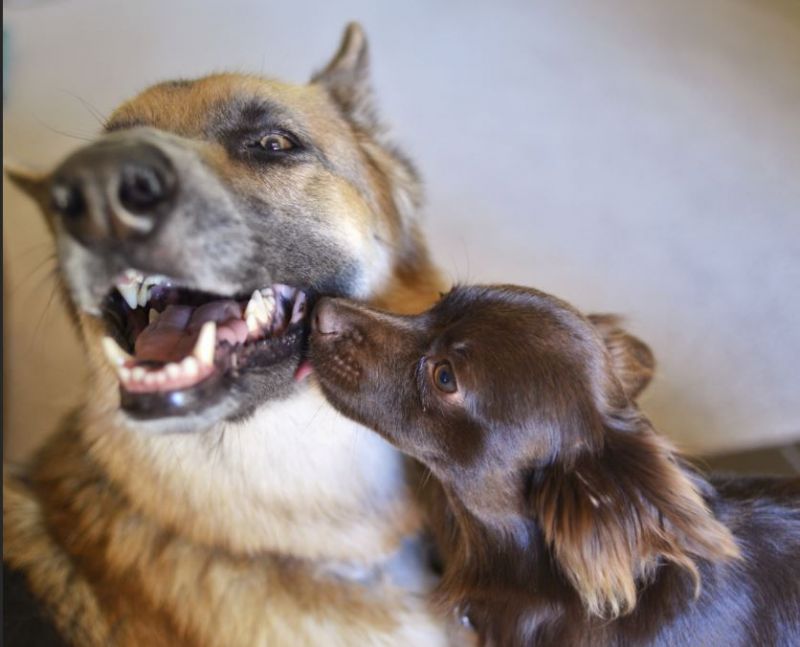
Dental disease is one of the most common things we see in veterinary medicine. It affects so many dogs and causes so much more than just bad breath. Things to look for that can tell you that your pet has dental disease are:
Bad breath
Plaque or tartar (tan or brown rough material that seems stuck to the surface of their once pearly white teeth)
Red or swollen gums
Bleeding when the gums are brushed
Loose teeth
It is important to know that almost all pets will continue to eat and often will not show any outward signs of pain or discomfort, even with advanced stages of dental disease. However many pets following treatment of their dental disease will feel much better – especially when the disease is severe, I've heard some clients say that their dog is acting like a puppy again.
One of the best ways to prevent periodontal disease is to practice regular dental home care with your pet. It can make a tremendous difference in your pet's health and comfort. It may also decrease the number of dental cleanings needed as well as decrease the severity of disease within the mouth that will need to be treated. The most important thing for dental care is that it is practiced regularly. It must be done on a frequent basis, long-term. The ways we can tackle this are listed below - combining multiple strategies is often helpful.
Tooth Brushing
This is the foundation for excellent dental health. It is important to purchase pet toothpaste, as human toothpastes can contain xylitol, which is toxic to pets.
Gradual introduction to tooth brushing can often help to get your pet used to the process, so it doesn't become a battle. First, introduce them to the toothpaste. This can be as simple as allowing them to lick it off your finger. Then, get them used to getting their mouth and teeth touched and manipulated. Do this by lifting their upper lip and moving your finger along their gums in a backward to forward motion on either side of their mouth. Then, allow them to lick the toothpaste off the toothbrush so they get used to the texture of the bristles. Finally, introduce the toothbrush to their mouth. For each step, allocate a week or so, always using treats and praise to make the experience a positive one.
Brushing your pet's teeth allows breakdown of plaque. It takes three days for plaque to turn into hard tartar or calculus. It is best if brushing is implemented on a daily basis.
Chews
The dental chew we most often recommend is the C.E.T. dental rawhide (C.E.T. Enzymatic Oral Hygiene Chew made by Virbac). The action of chewing on the rawhide provides friction that also helps to take off plaque. The rawhide is also coated in an antiseptic, so as the dog chews the antiseptic gets coated onto their teeth. Greenies are the other major dental chew product on the market. In my experience, the C.E.T. rawhides work better.
The American Veterinary Dental College does not recommend bones, cow hooves or hard nylon chews. These things are often too hard for pet's teeth and can often result in fractured or broken teeth.
It is always important to monitor your pet when they are chewing on any chew toy, especially if you are introducing it for the first time. This is to make sure your pet does not try to swallow it whole or swallow too large of a piece, as that can cause issues.
Diet
Hill's t/d is another tool we employ. It's a dental diet that helps to take off plaque as it's being chewed. The things that make it special are its kibble size is larger and the kibble itself is harder, requiring more chewing. The kibble also employs a fiber matrix that helps to scrub the teeth during the chewing process. This diet is formulated for both dogs and cats. It can be given as treats, or can be given as part or all of their diet.
Did you know that September is national pet dental health month? While I recommend that every pet get regular dental care at home, if enough hard tartar or calculus has built up on the teeth, no amount of tooth brushing or home care is going to get rid of it. If pets have a significant amount of build up on their teeth, a dental cleaning is needed first. Please talk with your regular veterinarian to get your pet's teeth assessed and see what the best plan for their dental care is.







